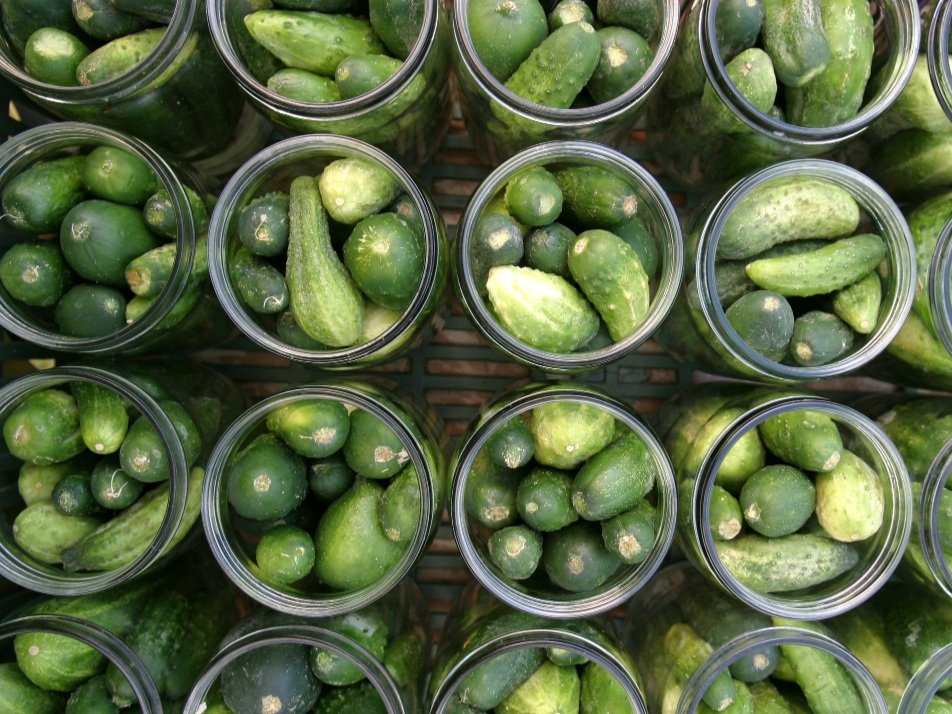Pickles for PCOS: How Vinegar Helps to Manage Blood Sugar
by Dr. Emily Lesnak
Are you a pickle lover like me? They really are the best! And a bonus with pickles is that they can help manage your blood sugar, which is important when it comes to treating and managing polycystic ovarian syndrome (PCOS).
What is PCOS?
PCOS is a collection of symptoms that can include missed periods and, despite the name, you actually don’t need to have cysts on your ovaries to be diagnosed with this condition. The official PCOS diagnosis requires you to have 2 of the 3 symptoms outlined below:
Many months with skipped periods or longer than normal cycles
Increased androgen (testosterone and DHEA) h hormones
Many ovarian cysts seen with pelvic ultrasound
What does blood sugar have to do with PCOS?
Many people with PCOS have something known as insulin resistance. Insulin is the hormone that helps to take sugar out of the bloodstream and into the cells to be used for energy. With PCOS cells in your muscles, fat, and liver stop responding well to insulin over time (this is known as insulin resistance) which can lead to elevated levels of sugar in your bloodstream over time. These chronically elevated blood sugars can then cause problems like, prediabetes, diabetes, PCOS, etc.
Insulin resistance also stimulates the ovaries to produce increased amounts of testosterone and this can contribute to acne, irregular menstrual cycles, unwanted hair growth, and weight gain.
Your pancreas makes insulin, which is a hormone that moves sugar out of the bloodstream. The more sugar in your bloodstream, the more insulin your pancreas has to make to keep up. If these cells are resistant to insulin then your body is not able to get sugar out of your bloodstream as effectively.
How pickles can help:
Back to the pickles! So when we are looking to improve PCOS and insulin resistance specifically, vinegar can be effective in reducing blood sugar and insulin levels after we eat by decreasing what is called “gastric emptying”. Gastric emptying is the rate in which food goes from your stomach to your small intestine. Any fermented food or food product with acetic acid (pickles!) can slow the rate at which food is moving and the acetic acid tells your muscle cells to take up more sugar. So together the two help to fight the insulin resistance and elevated blood sugars.
Putting this into action:
You can start using this trick to support your PCOS and blood sugars by doing the following simple steps.
Start by having a few slices of pickle or even a small amount of vinegar prior to meals. This can be especially helpful with meals that are very carbohydrate heavy because they tend to have more sugars and, therefore, require more work from our pancreas.
Plan to have pickles or vinegar at least 1-10 minutes before eating. I often recommend 1 Tablespoon of apple cider vinegar, but any type works or this could even work in the form of vinegar in a salad dressing.
If you’re taking the vinegar by itself make sure to dilute it with a little water so the acetic acid does not damage the enamel on your teeth.
Pickles can absolutely help with PCOS! And this can be a relatively easy way to help manage blood sugar without making big changes to what you eat and it can have a significant impact on blood sugar and insulin over time.
Pickles for the win!
Want to learn more strategies to improve your PCOS?
Join me for my upcoming 4 week PCOS group series (call the front desk to learn more!) where we will cover specific topics related to lifestyle and supplement-based therapies to help treat PCOS, balance hormones, and improve fertility!
see you in clinic,
Dr. Lesnak
References:
Liljeberg, H., Björck, I. Delayed gastric emptying rate may explain improved glycaemia in healthy subjects to a starchy meal with added vinegar. Eur J Clin Nutr 52, 368-371 (1998). [https://doi.org/10.1038/sj.ejcn.1600572](https://doi.org/10.1038/sj.ejcn.1600572 "smartCard-inline")
Shishehbor F, Mansoori A, Shirani F. Vinegar consumption can attenuate postprandial glucose and insulin responses; a systematic review and meta-analysis of clinical trials. Diabetes Res Clin Pract. 2017 May;127:1-9. doi: 10.1016/j.diabres.2017.01.021. Epub 2017 Mar 2. PMID: 28292654.

